


tanding beneath the lights on the stage of the Festival Playhouse theatre, Quincy Isaiah ’17
—or Quincy Crosby, to his classmates—could not look more at home. The Playhouse is, after all, a place where stories come to life and dreams take hold for theatre majors like Isaiah, and this moment is a kind of homecoming. As he poses for photos, talking animatedly to his mentor, Professor of Theatre Arts Ren Pruis, a smile lights up his face. And for fans of HBO’s hit show Winning Time: The Rise of the Lakers Dynasty, that smile strikes a familiar chord: Isaiah recently portrayed the iconic Magic Johnson in the series, channeling the basketball pro’s legendary charisma into that megawatt smile.
Isaiah was on campus with fellow alum Adam Edery ’19 to screen their new independent film Grassland, a social justice drama produced by Edery and featuring Isaiah in a lead role. In between meeting with students and joining a screening and discussion panel at the Arcus Center for Social Justice Leadership, Isaiah sat down with LuxEsto to talk about his journey as an actor.
Some people are theatre kids from a young age, but Quincy Isaiah grew up in his hometown of Muskegon, Michigan, doing a little bit of everything.
“I was in junior ROTC, I played trombone, I was in sports, student leadership, TV production. But I remember in sixth grade we split time between band and drama class. We would read these magazines with scenes from plays or movies, and I remember how excited I would be to read these characters. I always wanted the biggest part,” he said. “And then my senior year of high school, I took theatre. I was able to do Thoroughly Modern Millie. It was hilarious, and I think I needed that introduction in high school to see the fun and playful side of theatre. But it didn’t feel real until I got to college. The stuff that we did here, it shifted my perspective about acting and the craft—and the craft is what I fell in love with.”
When he first came to K, theatre wasn’t the end goal. He came to play football and to pursue a degree in business. Yet as often happens at K, a series of fortunate events changed the trajectory of his life.
Junior year, the theatre bug bit when he participated in a Second City-style comedy revue called Sketch-a-etch, produced by Katie Lee ’16 for her Senior Integrated Project (SIP). A conversation post-show with Professor Emeritus of Theatre Arts Ed Menta encouraged him to pursue more theatre experiences.
During that same year, Isaiah traveled to Madrid, Spain, for his study abroad, an experience that reshaped how he thought about his career choices.
“Study abroad is among the top three best things I’ve done in my life—just the experience of seeing what else is out there and understanding that the world is bigger than Michigan, bigger than Muskegon, Kalamazoo or even New York and L.A.,” Isaiah said. “One of the things I observed abroad was that careers aren’t seen as these precious things. It’s just a way of making money. I think that was very empowering to me. That helped me later to say, ‘Oh, OK, I don’t have to be an accountant because it’s a ‘secure job.’ Something is secure because of how you perceive it, but nothing is 100 percent secure. That was my biggest fear of becoming an actor—the perception that, well, if you’re going to be an actor, you’re probably not going to get a job.”
Then, the summer before senior year, Isaiah signed up for a calculus course at Kalamazoo Valley Community College for his business major, because the class at K was full. On his third day, Isaiah had a heart to heart with himself. Was this really the path he wanted to pursue?
“I dropped the class and switched to theatre coming into my senior year, and I didn’t look back,” Isaiah said, though he didn’t abandon business completely. He minored in business and completed a concentration in media studies. His SIP was about the business behind theatre, specifically at K, and the importance of procuring funding. “College theatre has always produced so many creatives,” Isaiah noted. “It gives more to the world than I think the world gives back to it.”
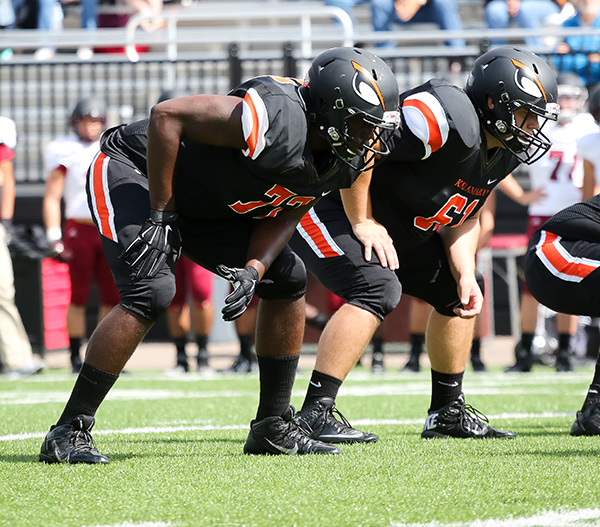
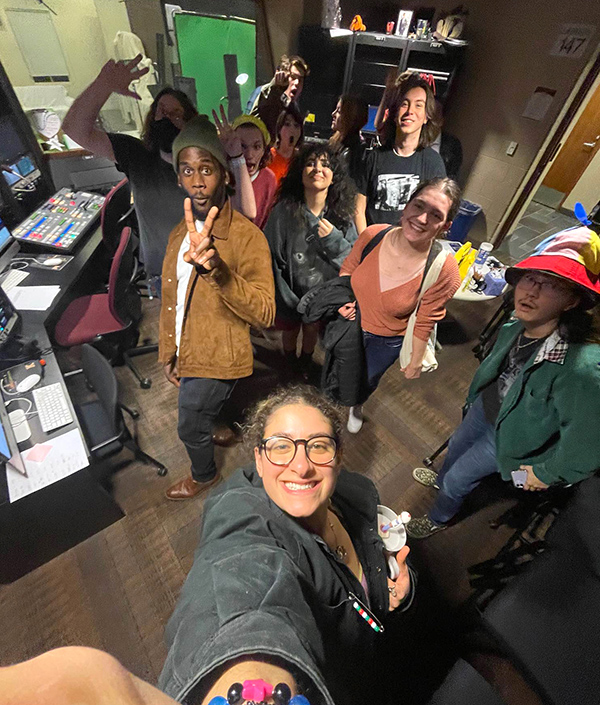
As a newly minted theatre major, Isaiah worked behind the scenes on The Rocky Horror Picture Show and on stage as Benny for In the Heights. He even had the opportunity to shoot a couple of commercials for Kalamazoo businesses. But the show that changed the game for Isaiah was A Raisin in the Sun. Isaiah played Walter Lee Younger, a character who serves as both the protagonist and antagonist in the acclaimed play.
Professor of Theatre Arts Lanny Potts recalled Isaiah’s portrayal in Raisin as remarkable. “I remember D. Terry Williams, the former chair of the theatre department at Western Michigan University, saying that Quincy reminded him of a young Sidney Poitier.”
Isaiah remembers coming out to the lobby after an evening performance. “People were still out there waiting, and I remember, somebody started clapping. And everybody started clapping and they were looking at me. And I was like, oh my God—it was such a fulfilling moment. And I think from there on, that’s when I said, OK, the choices that I made up to this point were right, and now I have to pursue this doggedly, and not allow fear to deter me from chasing it.”
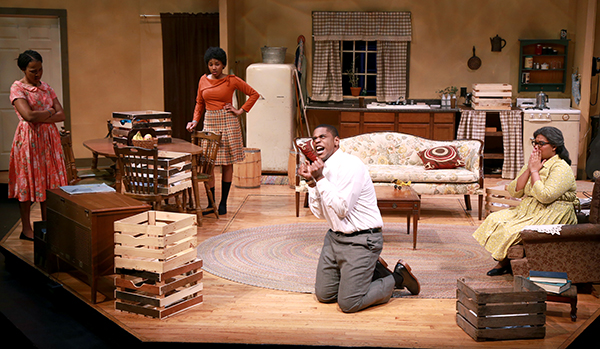
His journey was supported by professors who nurtured his passion for acting and expanded his horizons. “I had a class with Ren (Pruis) every year after I started acting, and she really helped me deepen my confidence in myself—not just acting, but as a person, because she’s so open and you can feel the heart and her attention to people. It was so inspiring to see that in a professor. So, I think for me, Ren was easily somebody that I was able to connect with in such a deep way.
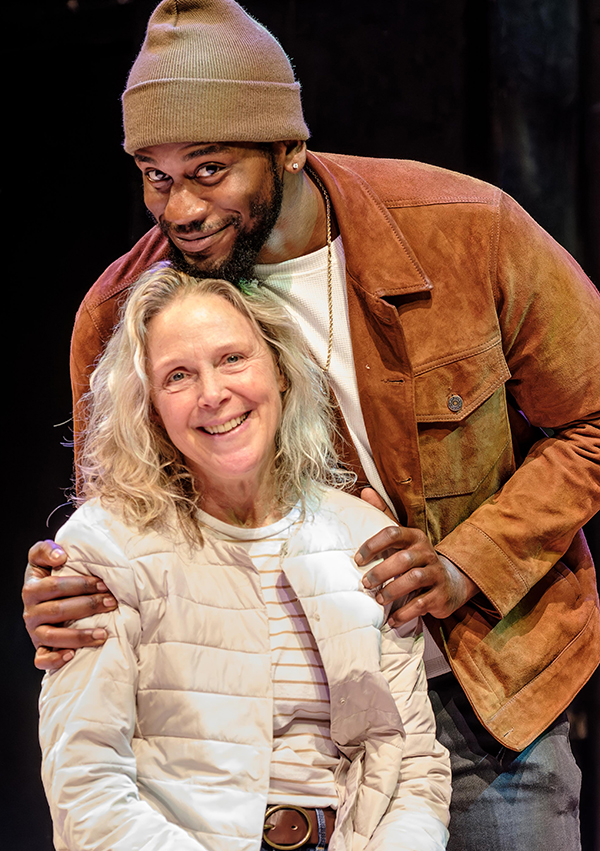
“Ed Menta was another OG. He deepened my understanding of theory and knowledge. He would preach: ‘Read plays, read plays, read plays,’ because he knew that you understand story and characters better. Lanny (Potts)—I constantly refer back to the senior seminar course that I took with him, where we read a book called Steal Like an Artist. As an actor, you take things from other people and make it your own. That’s what we do.”
Pruis said of Isaiah, “I knew he could be an actor and do the acting that he wanted to do. Early on, just his presence, his ability to be fully present on stage—and he would give so much to his fellow actors. I had him in voice and diction, and he had an ability to speak from a truthful place, while also holding enough power for the stage. It’s one of those things, when that happens, as a teacher, you get really excited. And he responded really well to direction—he would try out different choices with full commitment. He was eager to learn, and he always wanted to get better at what he did. It’s typical at that age to hold back a little bit because there’s a vulnerability that we have to allow ourselves when acting, and at that age—18 to 22—we tend to want to protect ourselves and have it all together. His willingness to be vulnerable to the art was very strong.”
Isaiah said his journey was also influenced by his time in the anthropology and sociology department (ANSO).
“I’m so grateful for the full experience I got at K. The theatre department, the ANSO department—both have my heart, because one was teaching me, oh, there’s a career out here for you. The other one was teaching me, this is how you navigate the world. The stuff that we were talking about in ANSO, it felt so honest to me in a way that other classes didn’t. In some classes, I felt like we were talking about things that I hadn’t seen show up in my first 18 years of life. In ANSO, I thought, I can speak to this. I felt very seen and heard in these classes, versus feeling like an outsider being welcomed into a space.”
During his senior year, as he was prepping for life after college, Isaiah spotted an ad on Instagram about the American Academy of Dramatic Arts and decided to click on it. He applied to the L.A. campus.
“They were like, ‘Come out. Come do a monologue for us. Let’s meet you’…so I planned a trip to go out to L.A. with my friend Abby Lu ’17, who was going out to USC (University of Southern California) for law school. I went in for the audition and I remember performing the monologue, and the lady I auditioned with said I had ‘leading man potential.’ I remember hearing that and feeling like, oh, OK, I can do this—because it’s one thing to do it in Kalamazoo. It’s another thing to go to L.A. and to hear maybe you’ve got something, and I think that validation put wind behind my sails. A few weeks later, I got in, and I was hyped. I’m like, ‘I’m going to L.A.!’”
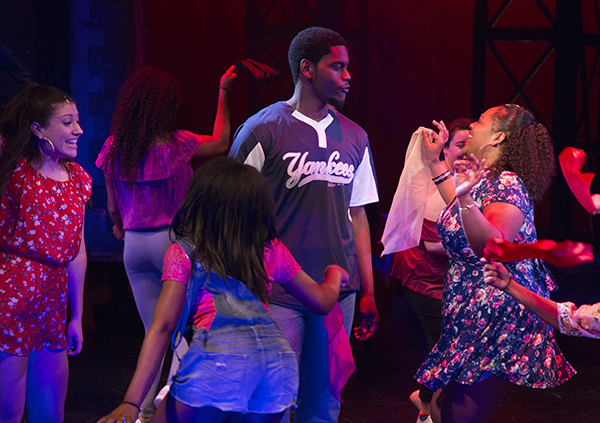
Once he was accepted, the business student in Isaiah kicked in, and he thought the debt associated with three years of acting school might not provide enough return on investment. He decided he could hone his craft through ad hoc acting classes while he looked for bit roles or background work.
“Before I moved to L.A., I was on Actors Access, which is a database where you can self-submit for roles and auditions, and I started getting auditions while I was still living in Michigan, because after K, I went back home. I was ready to go to L.A., and my mom, she was stalling me. She didn’t want me to leave. At a certain point. I was like, ‘Ma, I gotta go, I gotta be out there in order to book something,’” he said, grinning.
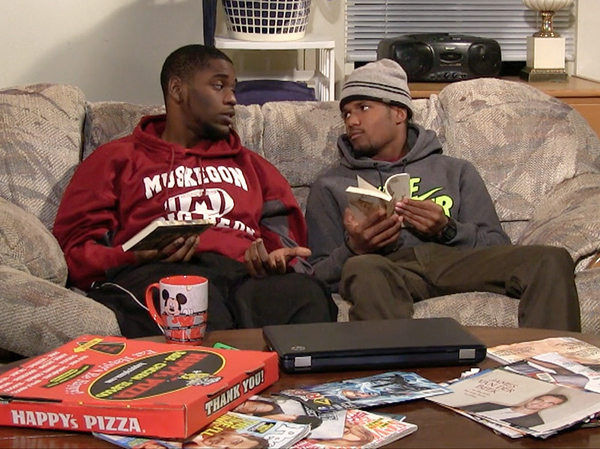
“Once I left, I started booking short films and student films. I put together a reel, and there was this part of Actors Access called Talent Link, where you could put your portfolio in front of agents and managers. I signed with an agent who started putting me out on auditions. I didn’t book anything with her at first. Nothing. I was getting a lot of auditions. I got a couple of callbacks for commercials. But there wasn’t anything until Winning Time. She submitted me for Winning Time. And I got the call back, and from there, you know, the rest is history.”
Earning the role of Magic Johnson was gratifying for Isaiah, but he didn’t let it go to his head. “I’m such an under-promise, over-deliver person, so I tried to stay even keeled. I think for me, once I got that call, I knew it wasn’t the big ‘It’ yet—one, I hadn’t done anything, I just booked a part. I gotta do the role. (The series had) to get picked up. And after that I have to go do it again. So as gratifying as it was hearing that call, it just motivated me even more to say, all right, now I have to follow through. I get an opportunity to show what I can do.”
Winning Time aired for two seasons on HBO Max and chronicled the professional and personal lives of the 1980s Los Angeles Lakers. The series cast some serious star power, with actors like John C. Reilly, Adrien Brody, Jason Segel, Rob Morgan and Sally Field. It was a master class for Isaiah, seeing how they approached their work. His own work in the role earned him a Rising Star Award at the Critics Choice Association’s Fifth Annual Celebration of Black Cinema & Television.
“Season one, I was getting my footing. Going from student films and auditioning into being a lead on an HBO show surrounded by all these people—it was a huge shift,” he said. “I was learning on the fly how to maintain the character work. Magic is an energetic character, and I’m more laid back. I remember my producer, Rodney Barnes, would say, ‘Hey, I need you to do the thing.’ And the thing was that energy, that Magic charisma.
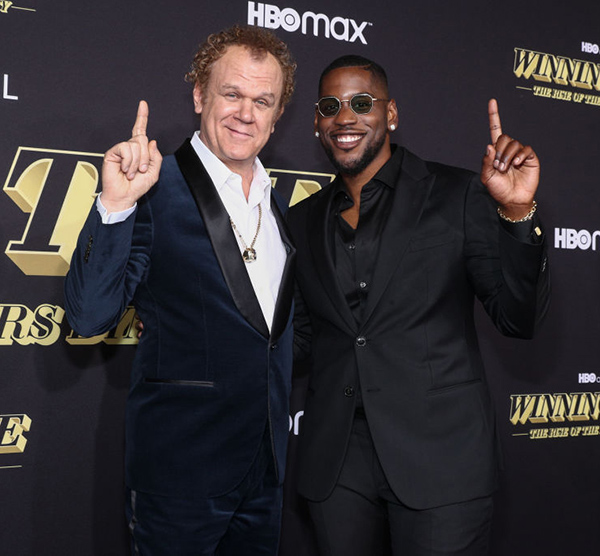
“Coming into season two, I was like, ‘OK, I’m ready.’ Not only was I more prepared for what I had in front of me, they also gave me material that allowed me to go different places and really get into my acting bag.”
One scene that stood out for Isaiah was in season two, when a frustrated Magic Johnson confronts team owner Jerry Buss (John C. Reilly) about the Lakers coach, Paul Westhead (Jason Segel), and the direction Westhead has taken the team.
“I remember reading that scene and being floored—I got to go in and go off,” he said. “The episode before that gave me a runway to get there, so I could see how it looked on paper. I knew what they expected out of me, and showing up that day, I was nervous. I knew that I had to deliver. I remember John C. being like, ‘Yo, you know the words. You know what this scene is about. You know the emotion behind it. Go for it, forget the words.’ And after he told me that, it was like something clicked in my head where I wasn’t thinking anymore. I was letting in all the frustration in my life and my career and just putting it on John. And he’s basically telling me, it’s OK. Give me that. And I think that’s when I took the words in the script and I made them my own, and that’s what shows up in the show. I’m eternally grateful for him—it really was such a teachable moment for me that I will never forget.”
During his talk on campus with K students, they asked him and Edery if they ever deal with impostor syndrome.
“I think I full-on felt that at the beginning of season one, where at that point, I haven’t proven myself,” Isaiah said. “Coming out of season two, there is such a difference—a swagger—that I feel about my career as a whole. I think before I was humble almost to a fault, where I wasn’t giving myself credit because I didn’t think I deserved it. Now, I’m understanding that there’s a way that you can speak to how great other people are, as well as yourself. And there was this tension where I didn’t want to be seen, but I would appreciate it when people did see me. And now I’m like, it’s OK. I don’t love to be seen all the time—but there’s a reason you’re looking, and I’m starting to embrace that part of it.
“I always come back to the work,” Isaiah said. “I’ve seen the work that I’ve been able to do, and now I’ve built confidence that there is more life after this role. This isn’t the end of my journey. It was only the beginning. It was a hell of a beginning! But there’s so much more out there for me to do and I’m just full of anticipation and excitement at figuring out what that looks like and building it out.”
That excitement about the future is taking shape in the form of new projects. There’s Grassland, where Isaiah had the opportunity to executive produce as well as act. And there’s a script about a blues hunter in the 1960s going down to the Mississippi Delta that makes his eyes light up when he describes it.
“It sent me down this rabbit hole exploring music history that I didn’t know. I just want to be a part of projects that teach me and inspire other people,” he said.
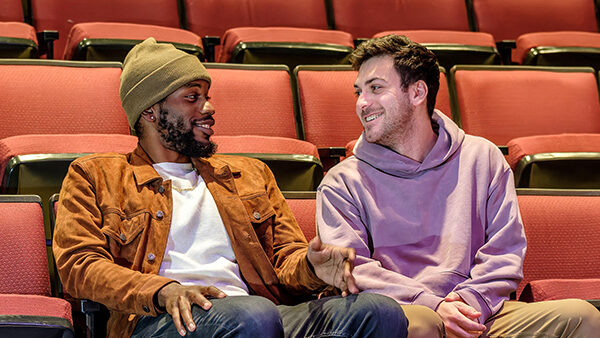
Isaiah also is working on a short film with a fellow actor that he plans to direct. “We are in the process of writing it. I don’t feel as bold about the writing process, but I love developing stories.”
For other young actors who are considering a career in show business, Isaiah offers some advice.
“Whatever you choose to do in life, make sure that it’s something you want to do, and not something somebody else wants you to do. Really tap into yourself. Then, if you decide that film, TV or theatre is what you want to do, you have a much stronger foundation, and you know what it is that you’re looking for, and you can’t be persuaded in the direction of what or who somebody else wants you to be. When you have that, people are going to respect you more. And when you say, ‘Hey, I don’t want to be that type of actor, I want to be this type of actor,’ you can make choices and decisions based on that.
“I remember I was deciding between two agencies, and one agent was saying, ‘Yeah, we’re going to have to change up your hair. For you to get cast, you need to do this or that.’ And the way that he was talking to me felt very Hollywood. And it was enticing because you think, oh, he must know what he’s talking about. Then I met with another agent, and it felt like she was more about the work. I was like, whoa, he feels more Hollywood, but she feels like she cares more. I eventually followed my gut and went with her, and for me that was one of the best decisions I made.”
One time while Isaiah was a student at K, a film director/producer came to campus, and Isaiah had the opportunity to meet with them in the library for coffee, to talk about the business and the industry. Isaiah emailed them before moving to L.A. and asked if they had any advice about moving there or different angles to get a foot in the door. The director told him to forget L.A.—go to Chicago and keep working on his acting there.
“They said, ‘Don’t go to L.A. yet; you’re not ready. I’m just being honest.’ I was like, all right, thank you for your feedback. But I remember reading that email and being like, ‘Yeah, whatever, I’m still going to L.A.’ And I think you have to have that certainty. Because most people don’t make it—it’s not their time, or they’re not equipped to do it. Or they get a big role, and they don’t do anything with it afterwards, because they didn’t want the career, they wanted the job. If you approach it like, ‘Oh, I made it,’ then that’s what you made.”
That’s not Isaiah. His determination is fierce. “I’m setting myself up to continue to grow. I just don’t see myself getting to a mountaintop and stopping. The mountaintop—and the valleys—that’s just part of the journey. And you have to embrace it all.”